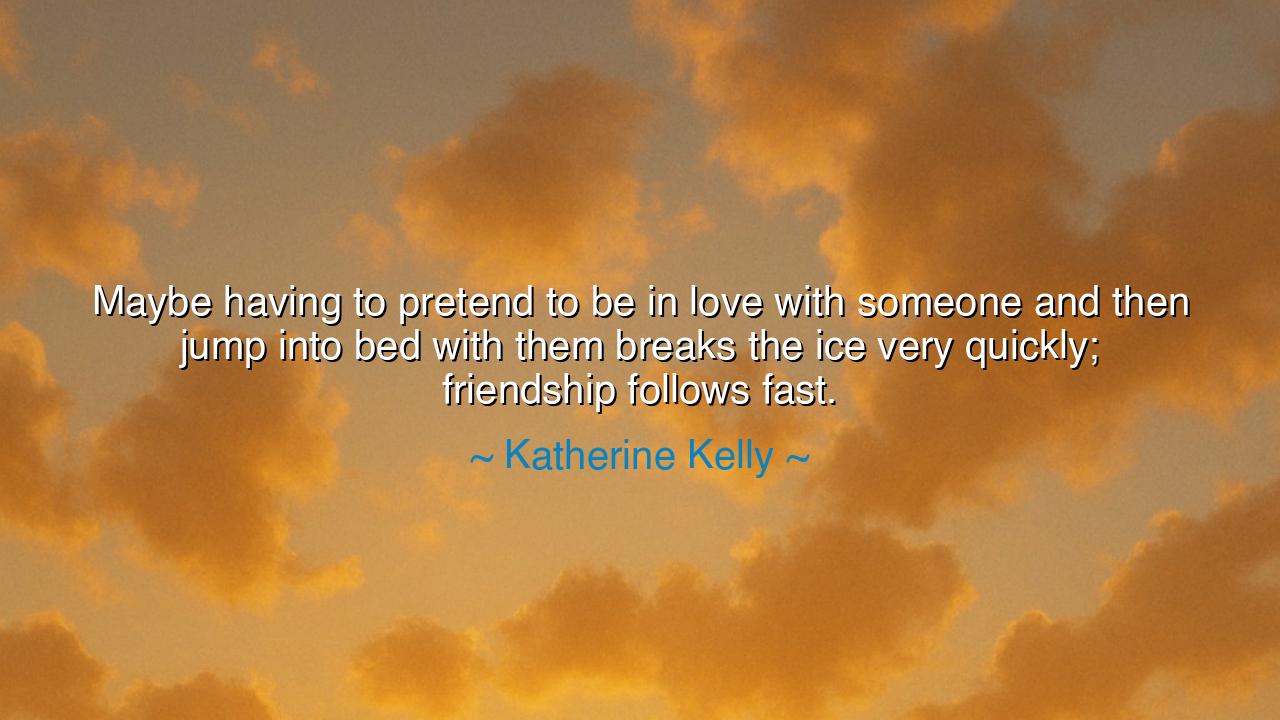
Maybe having to pretend to be in love with someone and then jump
Maybe having to pretend to be in love with someone and then jump into bed with them breaks the ice very quickly; friendship follows fast.






In the saying of Katherine Kelly, there lies a curious truth wrapped in humor and human insight: “Maybe having to pretend to be in love with someone and then jump into bed with them breaks the ice very quickly; friendship follows fast.” Beneath the surface wit, this statement reveals something timeless about human connection — that vulnerability, shared experience, and emotional exposure can draw souls together faster than years of polite acquaintance. When we act close, we often become close, for the heart cannot always distinguish between what is imagined and what is felt. Thus, through the performance of affection, something genuine may awaken: friendship born through intimacy, laughter, and shared risk.
In the days of the ancients, the actors of the Greek stage knew this paradox well. When they donned their masks and spoke words of love not their own, they often found real affection in the echo. To pretend is not always to deceive; sometimes it is to open the door to truth. In pretending to love, one must lower the walls of pride and fear, stepping naked into the realm of another’s gaze. Such exposure — physical, emotional, or spiritual — demands courage. And courage, as the old philosophers knew, is the beginning of trust. It is in trust that true friendship follows fast.
Consider the tale of Elizabeth Taylor and Richard Burton, two actors bound by art and passion. They first met as strangers performing lovers on stage and screen, their kisses written by others. Yet in those rehearsed moments of tenderness, something beyond the script took root. Pretending led to feeling, and feeling to chaos, love, and eventually — after the flames had cooled — friendship. Though their romance burned fiercely and ended twice, their bond endured beyond desire. They had crossed the fire together, and from the ashes rose respect and affection. Their story is proof of Kelly’s words: that closeness, however it begins, often forges connection deeper than reason.
But let not this wisdom be taken only in jest or in the context of actors. The deeper meaning lies in this: that when two souls are thrown together in moments of intense vulnerability, the masks fall away. Whether through shared labor, peril, or passion, when people are stripped of pretense, they meet as they truly are. It is not the act of love that binds them — it is the courage to be seen. Friendship is born not merely of common interest but of mutual recognition, of saying, “You too are human, and I see myself in you.”
In this, there is something both beautiful and dangerous. For intimacy — even the false kind — is a fire that burns away distance. Once you have looked into another’s eyes with tenderness, even in play, some boundary has dissolved. The ancients would have said that Eros sometimes opens the gate to Philia, that passion can be the messenger of friendship. But they would also have warned: tread carefully, for not every closeness is meant to last, and not every warmth is meant to be kept. To feel deeply is a gift; to know when to release is wisdom.
Yet, the lesson here is not one of caution alone. It is also a celebration of human connection — the way shared experience, even in the oddest of circumstances, can melt the coldness between souls. When we work, struggle, or create alongside others, we uncover the kinship that lies beneath all our masks. The actor’s stage is but a mirror of life itself: each of us playing roles, pretending confidence, affection, or indifference — and yet, sometimes, in the act of pretending, we stumble upon what is real.
Therefore, the teaching passed down from this saying is thus: do not fear closeness, even if it begins in awkwardness or artifice. Approach others with openness, for sincerity often grows from unexpected soil. Dare to be vulnerable, dare to laugh at the absurdity of human connection — and in doing so, you will find companions who understand your soul.
And so, dear listener, remember this final truth: life itself is a play upon the great stage of time. You will meet many who share your scenes — some briefly, some for years. Treat each encounter as sacred. For whether love, friendship, or mere chance brings you together, the heart that risks connection will never be truly alone.






AAdministratorAdministrator
Welcome, honored guests. Please leave a comment, we will respond soon